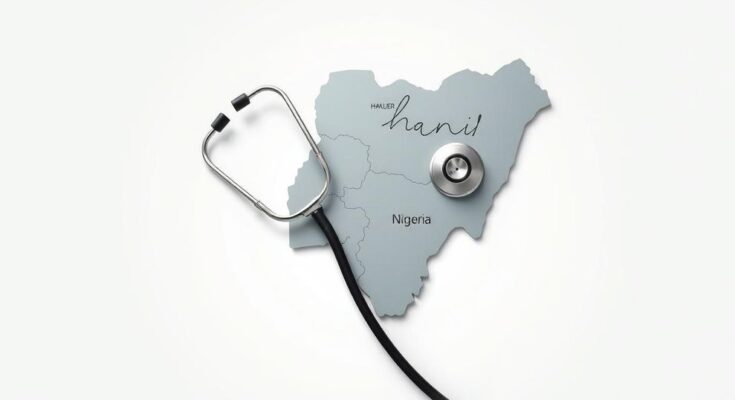The recent freeze on USAID funding due to U.S. foreign aid policy changes has devastated Nigeria’s healthcare system, halting crucial initiatives and leaving vulnerable populations at risk. Despite efforts by the Nigerian government to increase domestic funding, the shortfall from USAID remains significant. Activists and officials are voicing concerns regarding the long-term impacts on health services and calling for reforms to reduce reliance on foreign assistance.
The recent uncertainty surrounding foreign aid policy in the United States, prompted by Donald Trump’s return to the presidency, has raised alarms globally, particularly in Nigeria, which heavily relies on such assistance to bolster its healthcare system. Aaron Sunday, the head of the Association of Positive Youths with HIV in Nigeria, expressed his concerns over potential changes in aid that would significantly affect healthcare initiatives. Following an executive order freezing foreign aid, USAID projects, including the Lift Equity initiative aimed at improving adolescent HIV care, were abruptly suspended, hindering ongoing reforms and community engagement efforts.
Multiple civil society organizations in Nigeria reported similar suspensions of projects funded by USAID, alarmingly impacting healthcare, education, and vital services. With clinics closing, community health workers being recalled, and intervention programs on hold, the immediate ramifications are dire for those reliant on these initiatives for essential health services. The federal government and citizens are grappling with the reality that abandoned projects represent not just service lapses but real health threats to vulnerable populations.
Nigeria’s healthcare system has long depended on foreign aid, with the U.S. being the largest donor globally. In 2023 alone, the U.S. provided approximately $72 billion in aid, with USAID accounting for a significant portion, particularly in health funding. However, with USAID’s funding suspended, experts warn that the continued absence of assistance may lead to devastating consequences for the healthcare infrastructure and initiatives like HIV prevention and treatment.
In health interventions, USAID has been pivotal in providing aid for infectious disease outbreaks, vaccinations, and more, rendering its suspension problematic. The agency has previously contributed vaccines during outbreaks, indicating its pivotal role in maintaining health standards in Nigeria. Health professionals have voiced concerns that without USAID’s assistance, Nigeria’s access to vaccines will be restricted, posing a heightened risk to public health and safety.
Even with a recent waiver allowing “lifesaving” humanitarian assistance, the disbursement of such aid remains uncertain. The suspension has resulted in numerous HIV clinics shutting down, putting approximately two million Nigerians who live with HIV/AIDS at greater risk. Health advocates warn that the lack of care in less accessible communities particularly endangers populations already facing significant health challenges.
Additionally, USAID’s nutrition programs and support initiatives have been jeopardized, leaving communities without essential resources. Displaced persons, historically aided by U.S.-funded organizations, are experiencing a decline in humanitarian support, raising concerns for basic needs such as food and healthcare. Efforts in states like Ebonyi have also ground to a halt, reflecting the widespread impact of USAID’s withdrawal on various health and support programs.
In response to these challenges, Nigeria’s government has sought to compensate for the shortfall in funding, recently allocating a significant budget towards healthcare reforms and HIV treatment endeavors. Nonetheless, experts assert that these financial measures are insufficient compared to USAID’s historical contributions to the country’s health sector. The represented gaps could lead to increased disease transmission and healthcare burdens across Nigeria, underscoring the urgent need for robust domestic funding and health sector reforms.
Civil society organizations are actively seeking alternative funding sources and collaborating with government entities to ensure essential healthcare services continue. The overarching consensus among healthcare advocates is that the U.S. aid freeze serves as a critical wake-up call for Nigeria to enhance its health funding strategies. As this situation develops, analysis suggests potential permanent program discontinuations rather than temporary suspensions, which could reshape the landscape of healthcare in Nigeria significantly.
The U.S. policy on foreign aid, particularly the ramifications of USAID’s funding freeze, poses a severe threat to Nigeria’s healthcare system. Many vital services have been suspended, imperiling public health initiatives, especially those targeting vulnerable populations living with HIV/AIDS. While the Nigerian government increases domestic funding, projections reveal that it falls drastically short of compensating for the significant support previously provided by USAID. The current crisis serves as a crucial reminder for the government to develop strategies that enhance self-sufficiency in healthcare to mitigate future dependency on foreign aid.
Original Source: www.premiumtimesng.com




